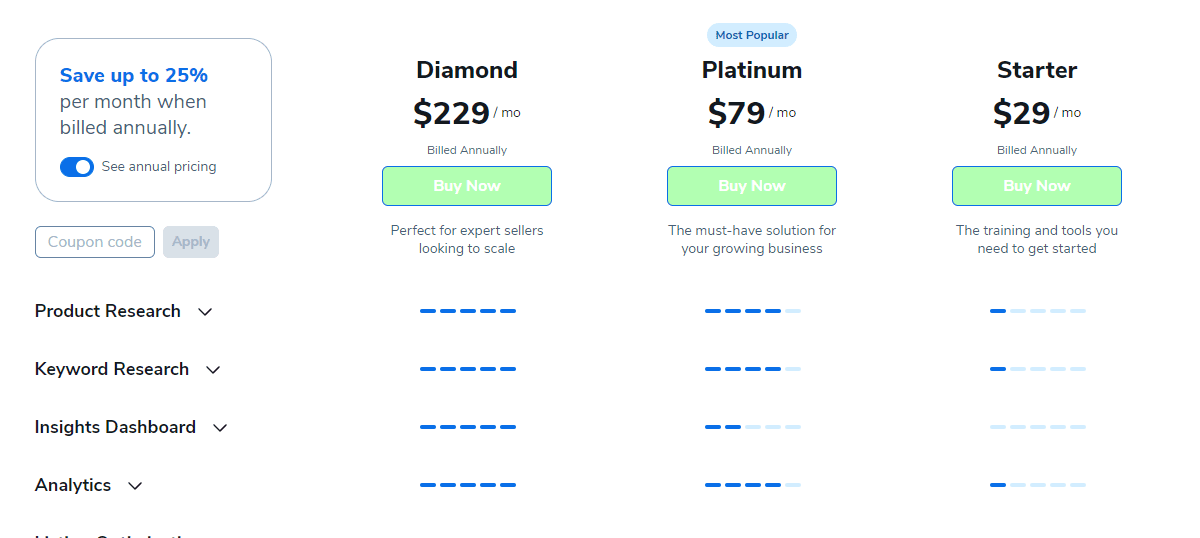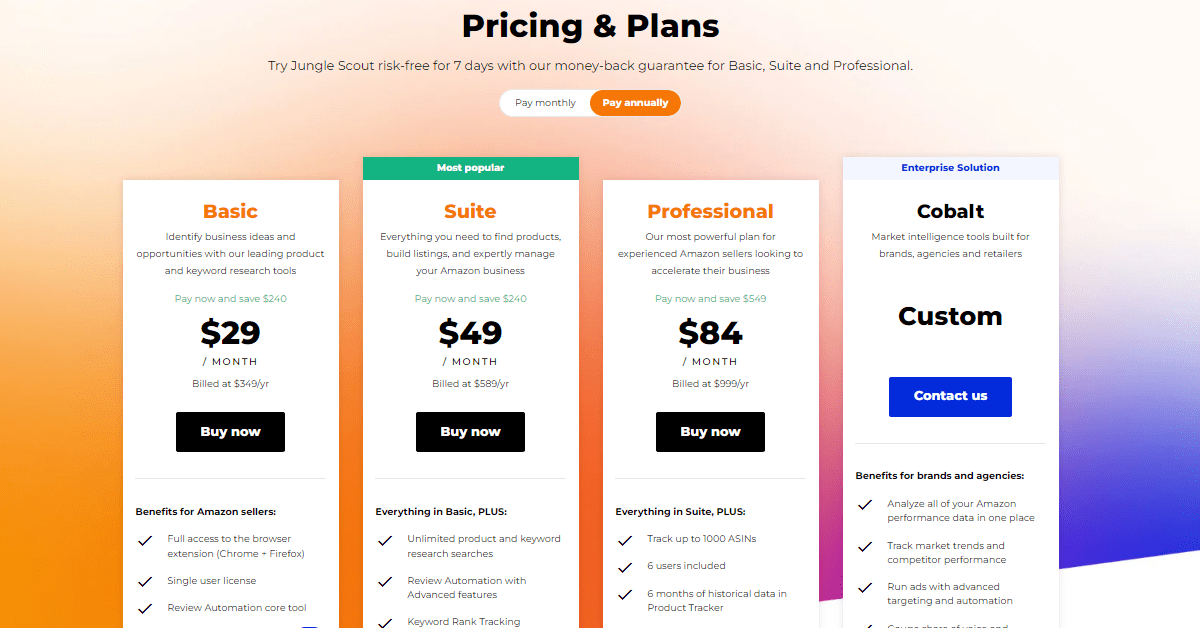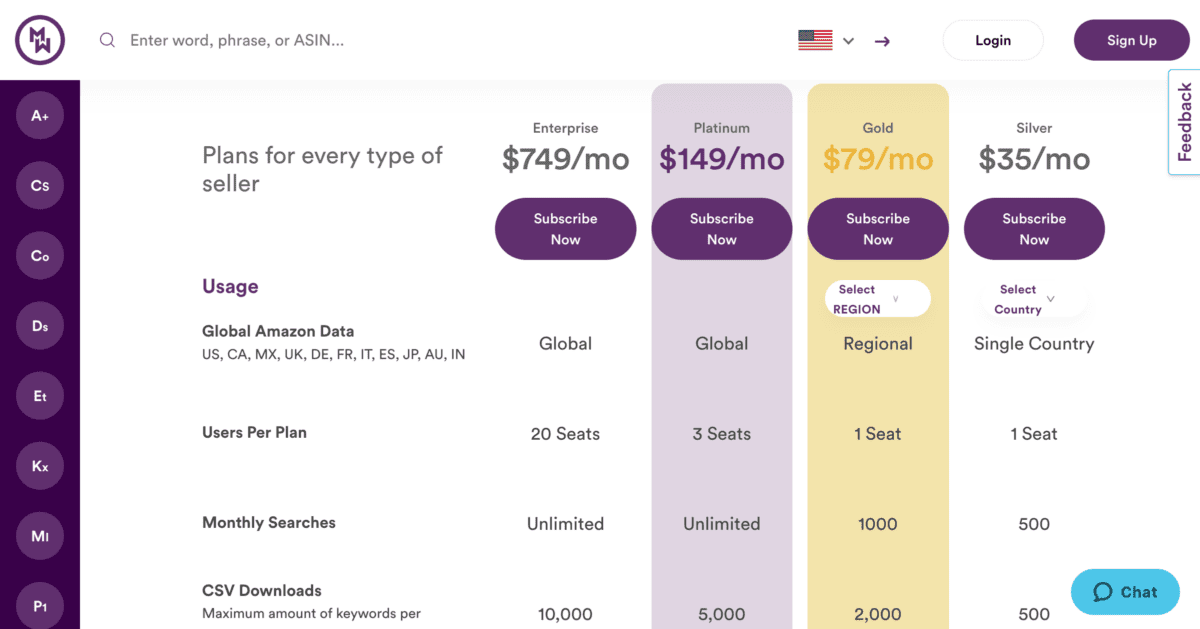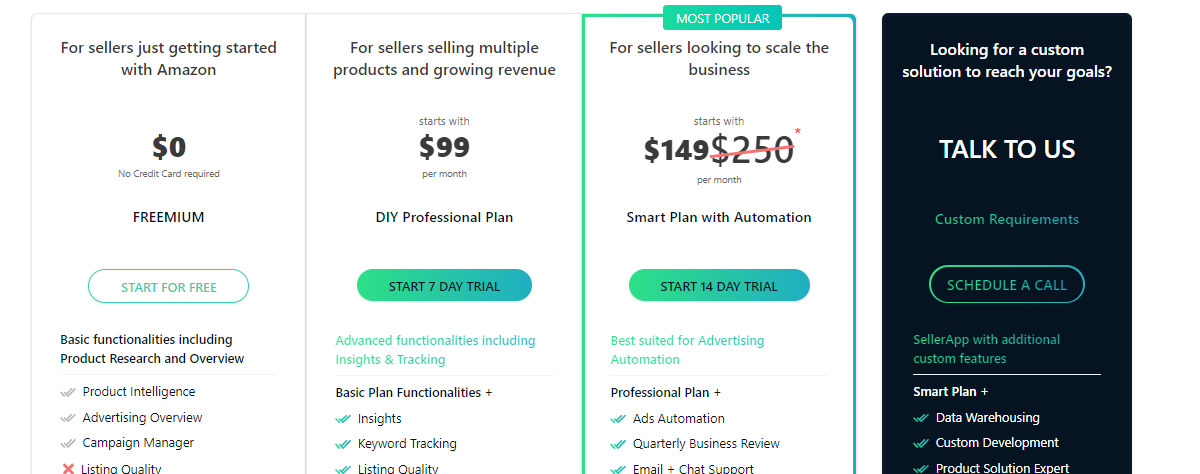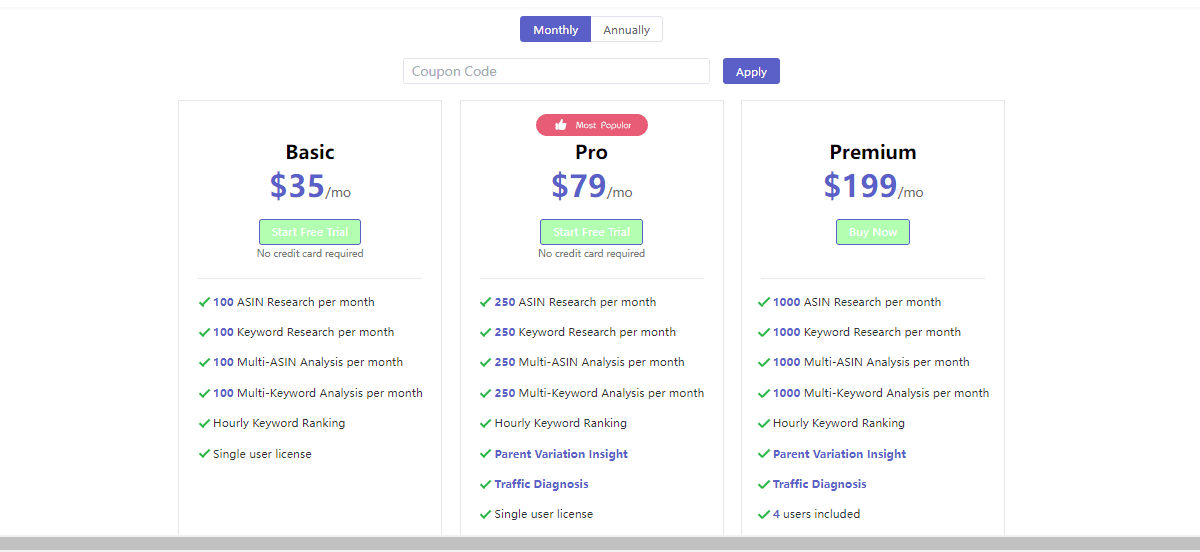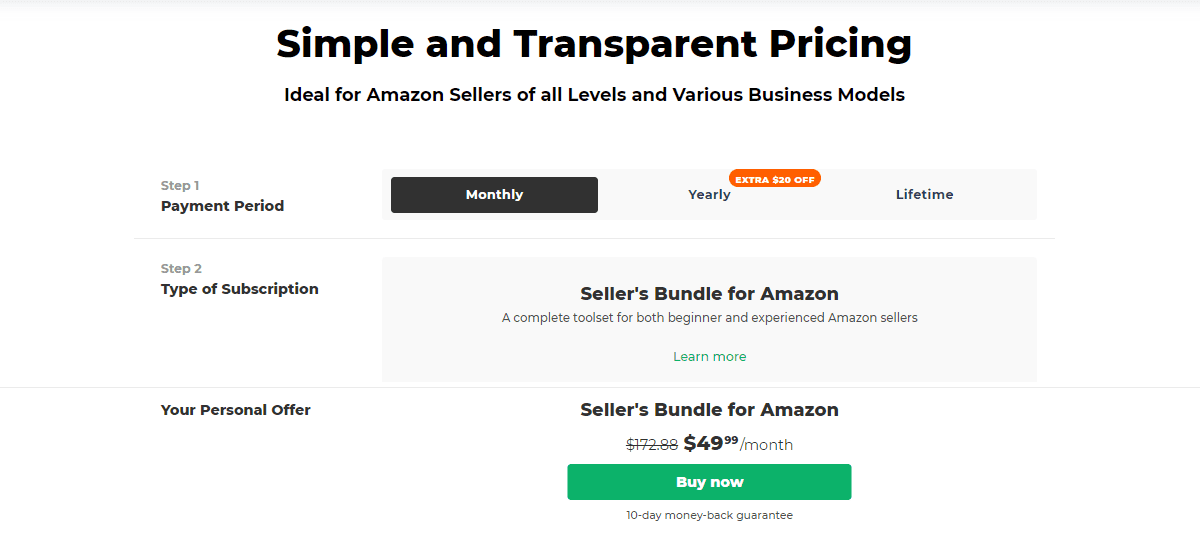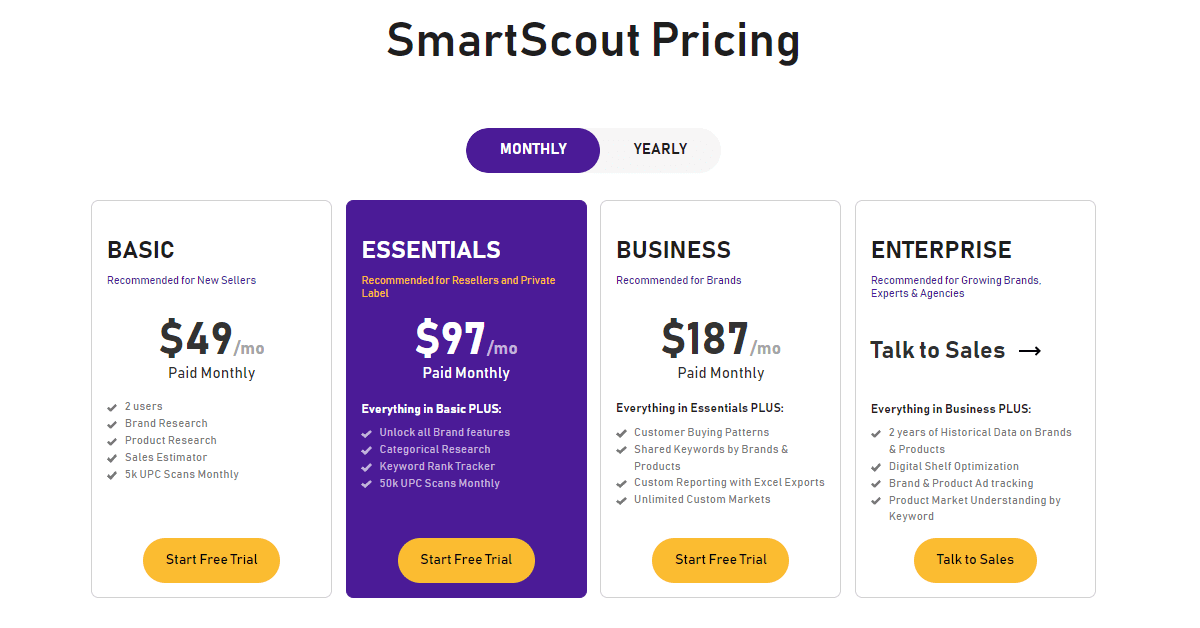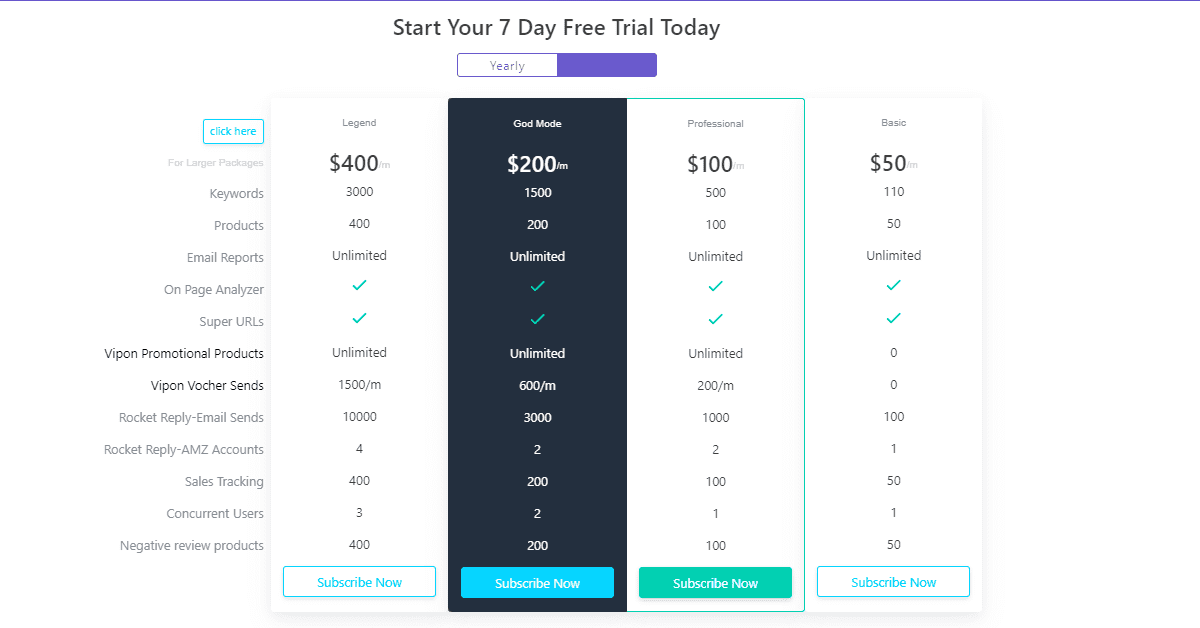Are you searching high and low for the right product to sell on Amazon? Or maybe you have a product in mind, but you can’t pinpoint the perfect keywords to get your product noticed.
I started using Amazon keyword research tools in 2015 when I started promoting products through my blogs. For this guide, we analyzed and tested the market’s top Amazon keyword research tools and compared 27 data points, including features, integrations, and pricing plans. We created an objective scoring system to help you filter through the options to find the best one for you,
Amazon Keyword Tools Compared
Truth be told. Most Amazon keyword tools do a pretty decent job of providing essential data such as monthly search volume and sales. But there’s only a handful of tools that allow you to effectively optimize your business on Amazon.
Pricing
Most of the tools have a list of common shared features such as keyword and ASIN research, competitor analysis and rank tracking. To provide you with the most meaningful analysis, we created a few tables to highlight the differences. As we stated before, most tools can help you figure out what to sell on Amazon. But once you get up and running, you may need a tool to help you find suppliers or optimize your listings. At that point, your options start to dwindle.
Research Features
After examining various options, we found that apps like Helium 10, Jungle Scout, Viral Launch, SellerApp and Zonguru are invaluable for Amazon sellers. Those tools combine keyword research capabilities with listing optimization, PPC management, inventory management, and review generation tools. All of these are needed to successfully scale your business on Amazon.
Growth Features
We suggest you avoid tools like Ahrefs, Keyword Tool IO, or Keyword Dominator. Despite their usefulness, they lack competitive sales data, a feature crucial for success in today’s cutthroat Amazon landscape. Because of this, we did not include those tools in this analysis.
Finally, when comparing keyword tools, you also have to decide what level of support and training you think you’ll need. If you need a lot of training and support, you may be better off with Helium 10 instead of MerchantWords.
Support
Importance of Keyword Research on Amazon
Understanding the importance of keyword research on Amazon is crucial for online sellers. It’s the backbone of your product’s visibility and tremendously impacts your sales. Relevant keywords help your product get discovered by potential customers, increasing your conversions.

Additionally, effective keyword research not only aids in ranking higher in Amazon’s search results but can also give crucial insights into market trends.
Just think about it – with the right set of Amazon keywords, your product could become the star of the show, catching the eyes of eager buyers left and right.
Understanding Amazon Search Algorithm
At its core, Amazon’s search algorithm, known as A9, operates with a primary goal: to connect shoppers with the most relevant and high-quality products. This advanced system considers multiple factors, such as relevance, price, availability, and sales history. Keywords play a significant role in this process. This diagram from Trellis details the process of how A9 Works.
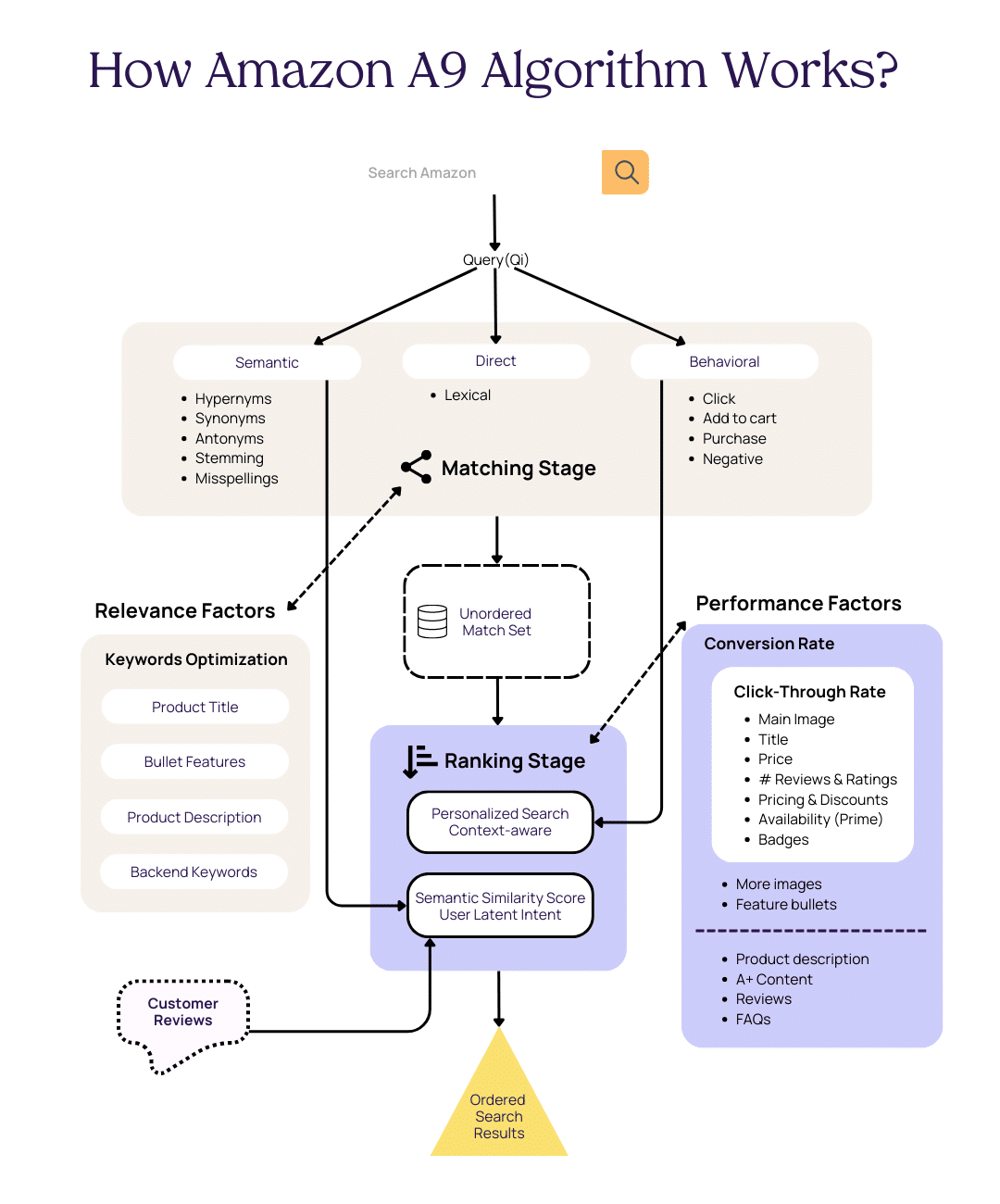
When a product listing effectively utilizes relevant keywords, A9 can more efficiently identify and rank the product, increasing visibility and potential sales. However, the algorithm evaluates the presence of keywords and the product’s performance, driving a dual focus on optimization and maintaining high standards in product quality and customer satisfaction.
Best Amazon Keyword Tools
Navigating Amazon’s competitive marketplace demands exceptional keyword research tools. While most, including Ahrefs, Keyword Tool, and Keyword Dominator, provide monthly search volume data, they often fall short by lacking key features. These include sales data, competitor analysis, and Amazon rank tracking—essential elements elevating your product’s visibility and boosting sales.
Helium 10 (Free Plan Available)
Helium 10 is an essential tool you can’t afford to overlook in your Amazon keyword research process. With an exceptional suite of features, including a comprehensive Keyword Tracker, a highly effective Cerebro tool for spying on your competition’s strategy, and the Frankenstein tool for keyword processing and management, your products stand a chance to reach the widest audience possible.

Its sophisticated algorithms and simplicity make it an indispensable asset for sellers looking to dominate their niche. It helps you understand customer behavior, track competitors, and optimize product listings.
Jungle Scout
Jungle Scout’s standout features include deeply comprehensive filters for finding profitable products, a Keyword Scout tool for high-demand keyword discovery, historical sales and pricing data, and a Listing Builder to optimize product titles and descriptions.

We also like the supplier database for to help you start your product sourcing process. Furthermore, their AccuSales Algorithm ensures reliable sales estimates.
Viral Launch
In addition to its sophisticated keyword research abilities, Viral Launch also provides two other standout features: Market Intelligence, a comprehensive tool for product research giving insights into sales trends, competition, and profitability, and Kinetic PPC, a tailored advertising manager that visualizes campaign performance while optimizing ad spend.

Everything is designed with an intuitive, user-friendly interface promising to streamline your Amazon selling process.
MerchantWords
MerchantWords boasts a comprehensive suite of features to aid in effective Amazon keyword research. Their toolset includes a database of global keyword data, digital shelf tracking, ASIN Plus, and Page 1 products.

The database provides millions of Amazon shoppers’ search data, while the digital shelf enables you to keep tabs on your competition. ASIN Plus reveals untapped Amazon keywords, and Page 1 identifies products that rank high on Amazon’s first page.
SellerApp
SellerApp is a robust Amazon Keyword Research tool that provides invaluable insights to optimize product listings. Its features include, but aren’t limited to, keyword research, product research, and competitor lookup.

This comprehensive platform uses data science and machine learning to analyze critical metrics essential for your Amazon business growth.
ASINSIGHT
ASINSIGHT is an instrumental tool in Amazon keyword research. It is particularly popular for its feature of Amazon reverse ASIN lookup. This unique feature enables sellers to uncover top-performing keywords driving sales to specific ASINs.
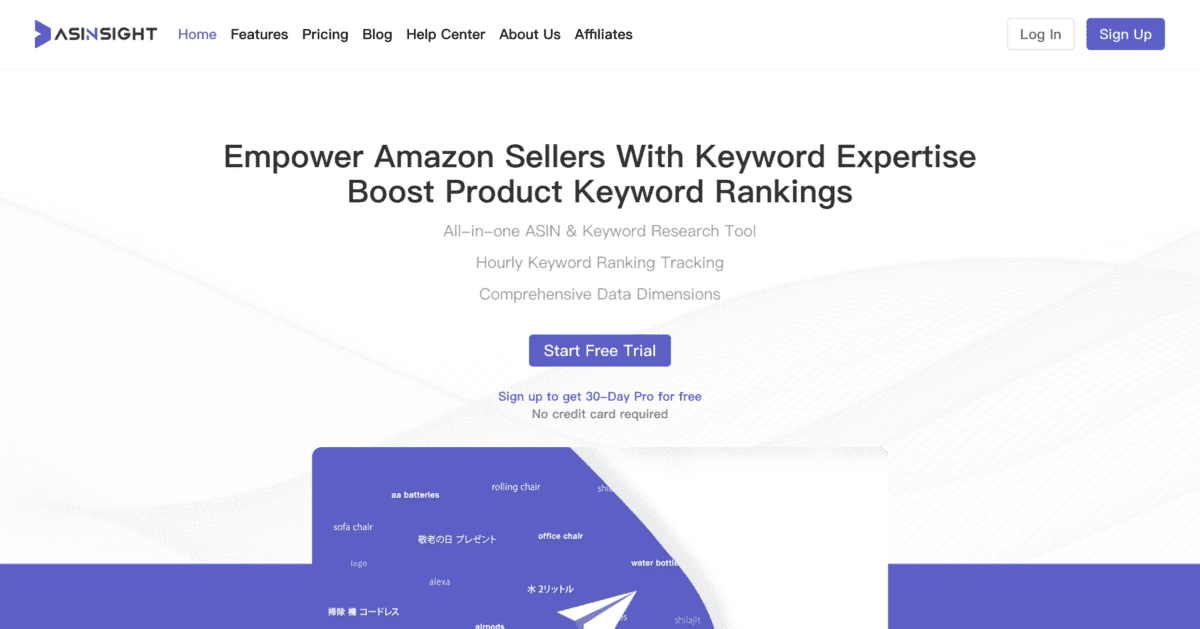
In addition, ASINSIGHT’s keyword tracking, index checker, and product research are notable aspects of this tool that businesses may find beneficial in their Amazon ventures.
SellerSprite
SellerSprite is an all-in-one Amazon tool offering features such as reverse ASIN lookup, product opportunity discovery, and keyword research. Exploring these features can uncover profitable products and key search terms, helping you win in Amazon’s competitive marketplace.

Founded in 2016, this tool rapidly grew in popularity among Amazon sellers. The platform has undergone several iterations since its inception, each time adding new functionalities that meet the evolving needs of its customer base.
AMZ Scout
When navigating Amazon’s competitive landscape, AMZ Scout provides an indispensable toolkit. This tool is supported with features like the Profit Calculator, Niche Score, and Listing Quality score to streamline your product research. The Chrome Extension allows you to find the most promising products in a matter of clicks, while the Product Database provides a comprehensive overview of every product listed on Amazon.

AMZ Scout offers a user-friendly interface designed to help both beginners and seasoned sellers find profitable products and keywords on Amazon. This tool provides comprehensive insights, such as sales estimates, FBA fees, and historical data, making it an invaluable resource for making informed decisions. Whether you’re launching a new product or optimizing an existing listing, AMZ Scout can help.
SmartScout
SmartScout offers a comprehensive suite designed specifically for Amazon sellers looking to optimize their private label businesses. It provides advanced tools such as brand analysis, product discovery, and market trend insights.

The software features detailed search filters, facilitating the identification of high-opportunity niches and products. With its intuitive dashboard, users can track competitors, assess market share, and pinpoint growth opportunities. SmartScout’s data-driven approach aims to enhance decision-making processes, ensuring that users can efficiently navigate the competitive Amazon marketplace and strategically grow their businesses.
AMZ Tracker
AMZ Tracker is a comprehensive tool for Amazon sellers to enhance their product rankings and visibility. It offers a suite of features, including keyword tracking, on-page optimization, and competitor analysis. One standout feature is its capability to monitor and improve the performance of product listings through actionable insights.
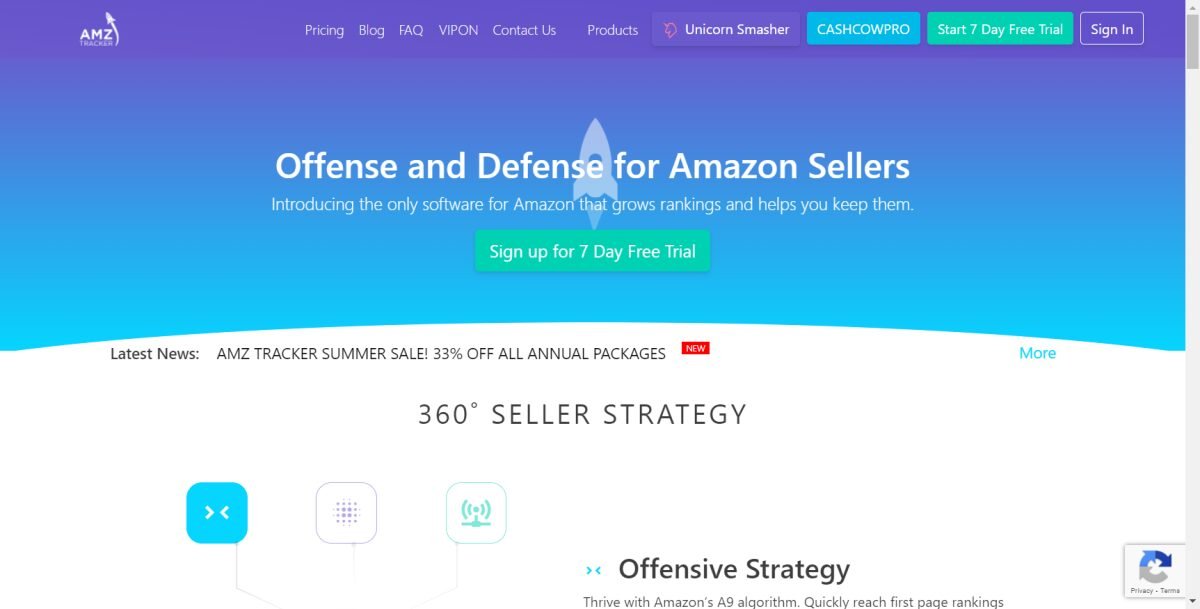
Additionally, AMZ Tracker’s integration with VIPon allows sellers to run effective promotional campaigns. It caters to all levels of Amazon sellers, providing them with the tools needed to maximize their sales and gain a competitive edge in the marketplace.
ZonGuru
ZonGuru is an all-in-one platform tailored for Amazon sellers, offering a suite of tools for product and keyword research, listing optimization, and business management. It provides features such as the “Niche Finder” to identify profitable product ideas, “Keyword Spotlight” for uncovering high-impact keywords, and “Sales Spy” to monitor competitor performance.

Additionally, ZonGuru offers personalized customer support and integrates seamlessly with various Amazon marketplaces. This makes it a comprehensive solution for enhancing sales and streamlining operations for both new and experienced sellers.
How To Do Amazon Keyword Research
Your journey to establish a successful online venture begins with a solid product idea. This could stem from dynamic market trends, distinct customer requirements, or a trailblazing solution to a ubiquitous problem. You’re ultimately striving for a product replete with extensive market potential capable of driving high online sales.
Once you’ve got your product, the next key step is mastering the art of keyword research. The first step here is to get relevant keyword suggestions.
Equipped with keyword research tools, you start this process by generating seed keywords—basic terms that correlate with your merchandise. These seed keywords can be expanded into more comprehensive phrases that potential customers might type in while searching.
For example, instead of “coffee mug,” concentrate on constructing a long-tail keyword like “large ceramic coffee mug with the handle.” Though they occur less often, long-tail keywords collectively can drive a major portion of your total online traffic. With their detailed nature, they typically have a superior conversion rate than broader, one-word counterparts.
Finding The Best Performing Keywords
One approach is to conduct keyword research using Amazon’s search bar and autocomplete feature. Start by typing in a relevant search term or phrase related to your product, then note the suggestions in the dropdown menu. These suggestions are based on popular searches conducted by other Amazon users, so they can provide valuable insights into which keywords are most effective at driving traffic and sales.
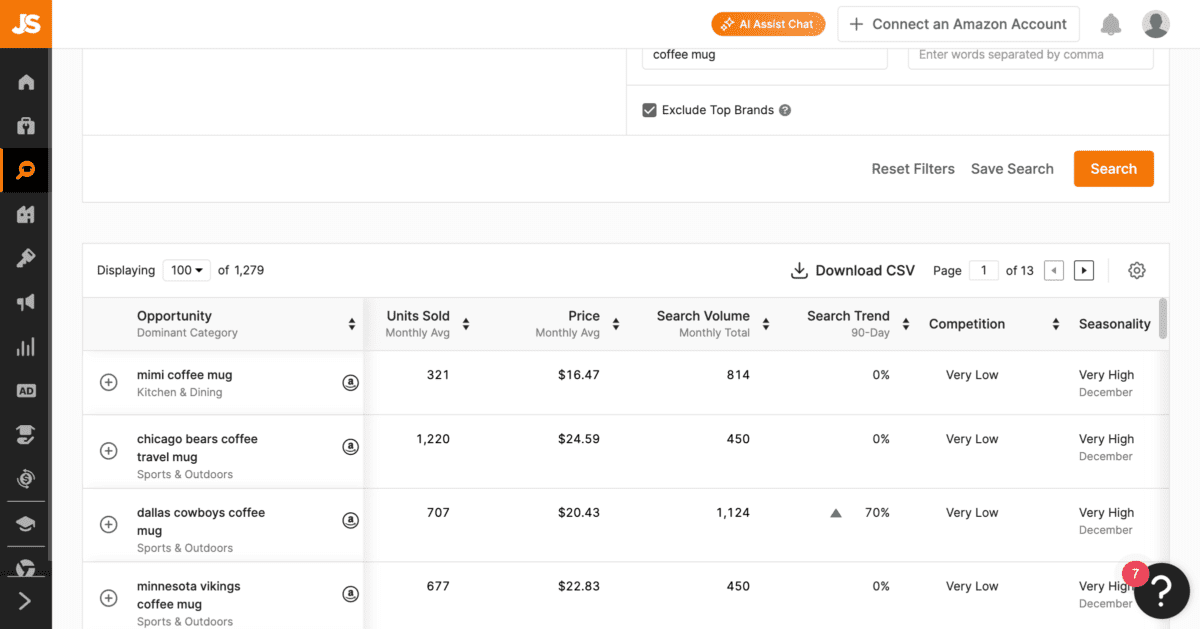
In this article, we included several tools you can use to help your Amazon keyword research. The keyword metrics you should focus on include:
- Sales history and trends
- Competition
- Number of searches
- CPC or cost per click
- Seasonality
Combine your initiation with this data to uncover lower competitive, in-demand products.
By monitoring your sales performance and experimenting with different keywords and tactics over time, you can optimize your listings for maximum visibility, relevance, and conversions.
Analyzing Competitor Keywords
Understanding your Amazon competitors can provide valuable insight into your keyword strategy within any market space. One way to tap into this information goldmine is by carefully analyzing competitor keywords. This essentially involves identifying and studying the keywords your competitors use for their products.

A well-executed competitor keyword analysis can bring to light opportunities you may have overlooked. Perhaps they’re using a long-tail keyword that’s sending a high volume of traffic their way—a keyword you could also use to draw more potential customers to your product page. It can also reveal instances where you might be competing for the same set of keywords, enabling you to adjust your strategy to either compete directly or focus on less cluttered but equally lucrative niches.
Implementing Keywords in Listing Optimization
Your chosen keywords are crucial in this optimization process, from the title and bullet points to the product description and backend keywords. The objective is to infuse these keywords naturally into your listing, creating a balance between readability for prospective customers and keyword catchiness for your Amazon SEO.

Being able to analyze an Amazon listing can really help improve your own rankings.
However, listing optimization isn’t just about integrating keywords. It’s also about managing your listing, monitoring your Pay-Per-Click (PPC) campaigns, and encouraging customer reviews — these are essential factors that influence your product’s visibility and conversion rates.
FAQS
Strategies for Continuous Keyword Research
Just like the retail world, the Amazon marketplace constantly evolves. Trends shift, new products emerge, and consumer habits change. This dynamism necessitates a continuous keyword research approach if you hope to keep your sales numbers up. Taking the pulse of your keywords enables you to adjust your listings and stay ahead of competitors. To maximize product visibility, consider these tips:
- Regular Review: Set a regular schedule to review your keywords. Depending on your product and market, this could be monthly, quarterly, or semiannually.
- Seasonality: Adjust your keywords to align with seasonal trends. Make use of holiday-specific or seasonal keywords during the year to attract more traffic to your listing.
- Tracking Tools: Use keyword tracking tools or software. This can help to anticipate shifts in keyword popularity or spot emerging trends.
- Competitor Check: Keep an eye on your competition and learn from them. Analyze their pricing and consider using automated repricing tools.
- Test Keywords: Don’t be afraid to experiment with different keywords. It’s very likely not all your keywords will perform equally. Learn and adjust accordingly.
- Long-tail Keywords: Consider the use of long-tail keywords. They drive less traffic but can be highly targeted and convert well, owing to their specificity.
- Keyword Placement: Make sure your critical keywords are placed in important spots like the product title, bullet points, and product description. Amazon’s algorithm pays more attention to these locations.
Remember, success at Amazon isn’t a one-time thing; it’s a continuous process. Stay vigilant and make necessary adjustments according to the market trends.


